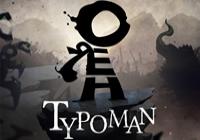Typoman: Revised (Nintendo Switch) Review
By Drew Hurley  22.02.2018
22.02.2018

Typoman: Revised is a little stickman made up of letters who has to traverse ruined industrial environments, solving puzzle and platforming segments along the way. There are threats to Typoman in this world, too - creatures made up of letters arranged into sinister words that will tear him into his individual letters should they catch him. To survive and progress, Typoman needs to take letters scattered in the environment and rearrange them into words to combat the villainous words. After reviews of the Wii U and PC versions, it is time to see how it translates to Switch.
There are plenty of word-based indie games out there and that is a great thing. Tangential learning is a superb way of learning through fun, without forcing or knowingly focusing on what they are doing. There's a reason that many adults today can list all 151 Pokémon, or are practically cartographers of Azeroth. Any new parents need to look into it. It's a fantastic way to get kids interested in subjects they may not usually be. Here the tangential learning is dedicated to growing the vocabulary of the player while practicing spelling.

At first, the game introduces very simple puzzles by laying out a small number of letters with a fairly simple solution. A closed door, for instance, with the letters 'P', 'E', 'N', 'O'. It doesn't take a genius to quickly rearrange these to open and proceed through. As the game progresses, though, the puzzles require more complex words and a little more lateral thinking. This may be something of a spoiler as it is an actual puzzle from later in the game, but the hero arrives in an area with floating platforms above an abyss to certain death and, just before it, there's an automated gun turret keeping watch. There is a pile of simple letters to re-arrange beforehand, but these are quickly replaced with machines that spit out letters of choice, allowing for more player freedom in overcoming such challenges. There are a few ways to overcome the example and that in itself shows the strength of the game.

However, there are some big issues with the puzzles. Some are ridiculously rudimentary to the point of being boring, mostly in the early stages, but occasionally in the later stages, too. Then, conversely, some of the puzzles are absurdly obtuse. Not difficult, just obtuse, with solutions that when they are revealed make no sense.
When the puzzles work best is when they include a gameplay element using an enemy made up of the word "LIE." This cute little creature is like a cross between a Scrab from Abe's Oddysee and a baby ABC-Warrior. A LIE can't hurt Typoman, but it can ruin puzzles by transforming words that he has made. The transformed word becomes an antonym. Smart use of this is essential, transforming a word entirely unrelated to the puzzle into its antonym just to get access to other letters.

This gameplay element becomes the entire basis of a mini-game. Within this little side activity, there are over 100 words to try and make, each time with one or more letter missing. The trick is building words that have antonyms containing the missing letters, then dropping in a LIE and seeing if it becomes a word containing the appropriate letters. This may be a small distraction but it's truly challenging and honestly more enjoyable than the main campaign.
One of the biggest issues with Typoman: Revised is one of the biggest issues with the Switch in general; the game has achievements that really enhance the experience. Some achievements feel horribly tacked on but some feel a natural part of the experience and that's certainly the case here, giving the player something extra to play for and more life to the game. There is a trophy to use a different word than previously used in each puzzle, for example, thus pushing the player to do something different.

Cubed3 Rating
Good
Typoman: Revised should have been a diversion dedicated to developing diction requiring proficient platforming prowess. Instead, it is a fleeting fancy, a lexicon of letdowns and saddeningly short. Ultimately, while Typoman: Revised has a solid system to base a game around, it ends up feeling like a missed opportunity thanks to its short length, clunky platforming moments, and unintuitive puzzles, but at least has some great achievements and an engaging antonym mini-game.

![]() 6/10
6/10
![]() 0
(0 Votes)
0
(0 Votes)
 Out now
Out now  Out now
Out now  Out now
Out now  Out now
Out now Comments
Comments are currently disabled

 Sign In
Sign In Game Details
Game Details Subscribe to this topic
Subscribe to this topic Features
Features





 Top
Top

